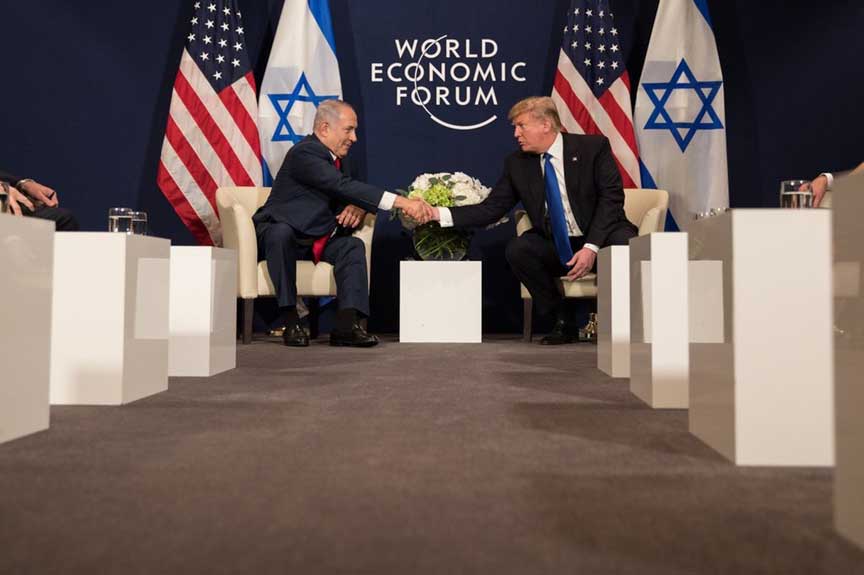1/25/18 A week of "Non Diplomacy"
It has been a busy time for ‘non-diplomacy’ in the Middle East. Early in the week, Vice President Michael “Mike” Pence visited Israel, and President Donald J. Trump met with Prime Minister of Israel Benjamin Netanyahu on Thursday.
The Vice President’s trip to Israel was clearly one of the strangest visits by a leading American politician in 40 years. Since the first Presidential visit to Israel, by President Nixon,— the peace process has been a central point on the agenda driving each President or Vice President of the United States. This time, however, besides paying lip service to his “hope for peace,” Pence's visit was a love-fest between the right-of-center Israeli government and the right-of-center Vice President of the United States. What Pence did not do, was meet any Palestinians — which was not his choice — since they decided to boycott him, as a response to President Trump’s recognition of Jerusalem as the capital of Israel.
To most Israelis, the Vice President’s words were music in their ears. In a speech that could have been written by a modern day Herzl, Pence laid out both the close, everlasting ties between Israel and the United States, as well as the historic mission of the State of Israel. Pence was repeatedly interrupted by clapping, except when he talked about the need for peace, bringing up the two-state solution, at which point, only the opposition parties clapped. Those who would have objected to Pence’s very Zionist speech were no longer in the hall — members of the mostly Arab Joint List Party had been ejected from the hall after raising signs declaring Jerusalem to be the capital of Palestine — (usage of placards and props is prohibited under Knesset rules).
Most Israelis were pleased by the announcement that the US embassy would be moved to Jerusalem by the end of 2019. Although those who pay close attention to US policy wondered what had changed between the time of the original announcement (when it was stated that the project would take 5-7 years) that caused Pence to announce the significantly shorter timetable for the embassy move. It was certainly not the enthusiasm the decision was met with in the Arab world. Nevertheless, the majority of Israelis were happy to celebrate any diplomatic win, and did not worry about any unintended consequences. Those consequences continued to emerge on Thursday when President Trump chided the Palestinians by saying,
“And when they disrespected us a week ago by not allowing our great vice president to see them, and we give them hundreds of millions of dollars in aid and support, tremendous numbers, numbers that nobody understands, that money is on the table and that money is not going to them unless they sit down and negotiate peace.”
Trump went on:
“Because I can tell you that Israel does want to make peace, and they’re going to have to want to make peace too, or we’re going to have nothing to do with it any longer.” Of course, being the consummate diplomat, Trump, at the same time declared he had “taken the issue of Jerusalem off the table,” once again undermining everything that his own US diplomats have been saying about the issue (i.e., that recognition of Jerusalem as Israel capital changes nothing in terms of final status negotiations) — and thereby, giving the Palestinians an excuse as to why that should not negotiate.
Most Israelis will be cheering Trump’s latest pronouncement. His approval rating in Israel continues to go up. Many will say the Palestinians have gotten exactly what they deserve. More thoughtful observers are worried. It is very clear that American foreign policy is not being made in any deliberative process. On Monday, Vice President Pence reiterated that US recognition of Jerusalem as Israel’s capital did not prejudge final negotiations … So how does that declaration square with Trump saying he has “taken Jerusalem off the table in negotiations” (something he also had tweeted two weeks ago). And while many Israelis think the Palestinians are largely responsible for the fact there is no peace (a claim Palestinians unquestionably deny), there are indeed 4.5 million Palestinians, many of whom live in poverty (especially, those in the Gaza Strip).
If the United Stats stops all aid to the Palestinians, someone else (like Iran) will step in, and instead of the moderating force provided by the US, we will have just the opposite. This change in approach is not in Israel’s interest. The Palestinians have climbed up a tree, in terms of their refusal to negotiate with the Trump administration. However, instead of bringing them a ladder, President Trump has brought a chain saw.
If that was not enough of a concern, there are those here in Tel Aviv who are worried about what will happen with the Iran agreement. President Trump has threatened that the US will resume sanctions in four months, effectively ending the agreement with Iran, if significant changes are not made to the agreement. Most agree the Iran agreement is flawed. However, there are very few people who believe the agreement can be fixed by a government whose foreign policy is being determined by the “policy of the gut”.
The world of 2018 is an infinitely complex place. Unfortunately, it is hard to see how the current leader of the free world — who sees only black and white — will be able to do anything, but make the current situation with both Iran and the Palestinians worse..
 >
>